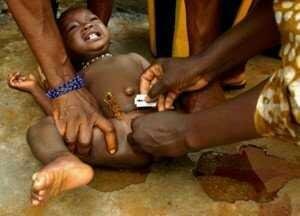DANGERS OF FEMALES GENITAL MUTILATION
Female genital mutilation ( FGM ), also known as
female genital cutting and female circumcision , is the ritual cutting or removal of some or all of the external female genitalia. The practice is found in Africa, Asia and the Middle East, and within communities from countries in which FGM is common.

UNICEF estimated in 2016 that 200 million women living today in 30 countries—27 African countries, Indonesia, Iraqi Kurdistan and Yemen—have undergone the procedures.

REASONS WHY FEMALE GENITAL MUTILATION IS PRACTICED
The belief that some parts of the body are unclean and unfeminine/male. So, they erroneously believe that those parts should be cut off for the female to be perfect and/or clean
Some communities believe that removing certain parts of the female genitals which they consider ugly, makes the female beautiful.
It is seen as the proper way to raise a girl.
Seen as a way to prepare a girl for adulthood and marriage.
In some communities, it increases marriageability because it is a condition for marriage in such places.
Social pressure to do what others are doing
People held in high regard (like medical personnel, community leaders, the circumcisers, and religious leaders) in some communities uphold female genital mutilation.
It is considered a part of the cultural tradition passed down from forefathers in some communities.
When people move into communities where FGM is practised, they may adopt it.
FOUR TYPES OF GENITAL MUTILATION
Type I (clitoridectomy) – Clitoridectomy or clitorectomy is the surgical removal, reduction, or partial removal of the clitoris.
Type II (excision) – removing part or all of the clitoris and the inner labia (lips that surround the vagina), with or without removal of the labia majora (larger outer lips).
Type III: The most severe form, it is also known as infibulation or pharaonic type. The procedure consists of narrowing the vaginal orifice with creation of a covering seal by cutting and appositioning the labia minora and/or labia majora, with or without removal of the clitoris. OR the practice of excising the clitoris and labia of a girl or woman and stitching together the edges of the vulva to prevent sexual intercourse.
Other harmful procedures to the female genitals, including pricking, piercing, cutting, scraping or burning the area.
HEALTH RISK ASSOCIATED TO GENITAL MUTILATION

Haemorrhage
Haemorrhage is one of the most common complications of FGM, as excision of the clitoris involves cutting across the high pressure clitoral artery and attempts to stop bleeding may not be effective. Acute extensive bleeding can lead to haemorrhagic shock or even sudden death in the case of cataclysmic haemorrhage.
Severe pain
cutting the nerve ends and sensitive genital tissue causes extreme pain. Proper anaesthesia is rarely used and, when used, is not always effective. The healing period is also painful. Type III FGM is a more extensive procedure of longer duration, hence the intensity and duration of pain may be more severe. The healing period is also prolonged and intensified accordingly.
Shock
Shock may occur because of blood loss and the severe pain and trauma of the procedure. Both haemorrhagic and neurogenic shock can be fatal.
Human immunodeficiency virus (HIV)
the direct association between FGM and HIV remains unconfirmed, although the cutting of genital tissues with the same surgical instrument without sterilization could increase the risk for transmission of HIV between girls who undergo female genital mutilation together.
Urinary retention
Urinary Retention is very common and may last for hours or days. It is commonly due to pain, tissue swelling, inflammation, injury to the urethra, and fear of passing urine on the raw wound.
Failure to heal
Wounds may fail to heal quickly because of infection, irritation from urine, underlying anaemia or malnutrition.
Difficulties with micturition
Difficulties can occur due to damage to the urethral opening, obstruction of the urinary opening, or scarring of the meatus - and can lead to chronic incontinence or difficulty passing urine. For many infibulated girls, passing urine can take up to 20 minutes when they are still virgins.
Menstrual problems
result from the obstruction of the vaginal opening. This may lead to painful menstruation (dysmenorrhea), irregular menses and difficulty in passing menstrual blood, particularly among women with Type III FGM.
Female sexual health
removal of, or damage to highly sensitive genital tissue, especially the clitoris, may affect sexual sensitivity and lead to sexual problems, such as decreased sexual desire and pleasure, pain during sex, difficulty during penetration, decreased lubrication during intercourse, reduced frequency or absence of orgasm (anorgasmia). Scar formation, pain and traumatic memories associated with the procedure can also lead to such problems.
Obstetric complications
FGM is associated with an increased risk of Caesarean section, post-partum haemorrhage, recourse to episiotomy, difficult labour, obstetric tears/lacerations, instrumental delivery, prolonged labour, and extended maternal hospital stay. The risks increase with the severity of FGM.
Obstetric fistula
a direct association between FGM and obstetric fistula has not been established. However, given the causal relationship between prolonged and obstructed labour and fistula, and the fact that FGM is also associated with prolonged and obstructed labour it is reasonable to presume that both conditions could be linked in women living with FGM.
WHERE DOES THE LAW STAND ON THIS ISSUE
FGM is considered a gross violation of the human rights of girls and women. In December 2012 the UN General Assembly adopted a resolution of the elimination of FGM.
The practice is illegal in the UK – it is also illegal to arrange for a child to be taken abroad for FGM. If caught, offenders face a large fine and a prison sentence of up to 14 years.
WHAT CAN BE DONE
If you know a young girl or woman who has undergone or is at risk from FGM , you should contact the police.
If the victim has already been taken abroad, you should contact the Foreign and Commonwealth Office.
Hello @wokejijasper,
You have received an upvote from @steempeninsula.
We upvote good posts and render community service.
Upvote this comment to help us grow the account to continue to help the community. You can also give your support in anyway e,g upvote and resteem our post for more visibility.
Here is our [Discord link]
To be a sponsor,kindly contact us through [Discord]
Together we will change the world.
This post has received a 0.11 % upvote from @drotto thanks to: @banjo.
Congratulations! This post has been upvoted from the communal account, @minnowsupport, by wokejijasper from the Minnow Support Project. It's a witness project run by aggroed, ausbitbank, teamsteem, theprophet0, someguy123, neoxian, followbtcnews, and netuoso. The goal is to help Steemit grow by supporting Minnows. Please find us at the Peace, Abundance, and Liberty Network (PALnet) Discord Channel. It's a completely public and open space to all members of the Steemit community who voluntarily choose to be there.
If you would like to delegate to the Minnow Support Project you can do so by clicking on the following links: 50SP, 100SP, 250SP, 500SP, 1000SP, 5000SP.
Be sure to leave at least 50SP undelegated on your account.